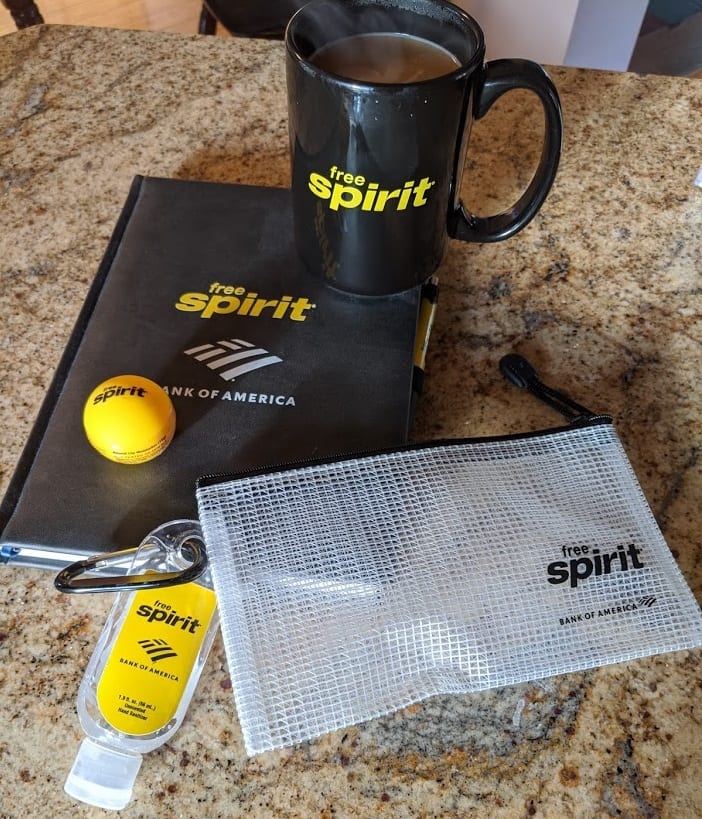NOTICE: This post references card features that have changed, expired, or are not currently available
Spirit Airlines has announced a total overhaul to its Free Spirit loyalty program. We had a chance to sit down and chat (virtually) with some of their executives yesterday about the new program. It is clear that they are excited about the changes. Very excited. And despite not providing an answer to the most important question about the new program (What will points be worth?), they were adamant that the new program will provide more value than ever before and that we will validate that when it launches on January 21, 2021. They were in fact so adamant about the fact that we would independently validate their claims that they wanted nobody to doubt whether I’d drunk the kool aid. Instead, they sent me a Free Spirit mug so that I could wake up and smell the coffee about the new Free Spirit.

I am far from convinced that the new program will be a good value (which is bolstered by their reticence to give us any answer, hint, or example as to the value of points in the new program), but on the other hand I think it is possible (and if I’m being fair I think probable) that this program may become the best domestic airline program for a primarily leisure / value traveler who primarily travels routes served by Spirit. There are a lot of qualifications in that sentence, but the truth is that I do see a place in the market for their program. Unfortunately, while there will be some potentially exciting developments in the credit card space, the problem that will likely keep me from recommending their credit card (at least initially) is that this appears to be an entirely revenue-based model program. With no clue as to the value of points for a redemption until you redeem (indeed I expect it will be entirely variable), it will be hard to recommend collecting their points via credit card. Still, I’ll leave room for the chance that this turns out to be as good a change as they are selling it to be.
Key changes to the new Free Spirit coming on January 21, 2021
The key changes coming to Free Spirit as of January 21, 2021 as I see them are:
- “Miles” will become “points”. Any existing miles you have will convert to points at a ratio of 1:1 and moving forward from January 21st, you will earn “points”.
- Redemptions will start at 2500 points for all members and will be based on the cash fare (no word on the value of points)
- Points & cash redemptions will be possible using as few as 1000 points
- Points won’t expire as long as you earn or redeem once a year (credit card holders’ points will not expire as long as their accounts remain active)
- Earning will be revenue-based (base members earn 6x fare and 12x on add-ons like seat selection, bags, etc. Silver members earn 8x / 16x and Gold members earn 10x / 20x)
- Elite status will be revamped (with some decent benefits) and relatively easy to attain (with $2K / $5K Spirit spend or $20K / $50K credit card spend)
Revenue-based earning structure in new Free Spirit program
As noted above, in the new Free Spirit program members will earn points based on spend rather than distance flown.
Base members will earn 6x points on base fares and 12x for add-ons like seat selection and bags.
Silver members will earn 8x on base fares and 16x on extras.
Gold members will earn 10x on base fares and 20x on extras.
I actually view this as an awesome development for rewards card enthusiasts: I have a bunch of cards in my wallet that can rebate airline incidental spend. With Spirit, those add-ons can make up the majority of the cost of a ticket. I’d be happy to be earning 12x or more on the parts of the trip that are rebated by my credit card.
New Free Spirit Elite status levels and benefits

In the new Free Spirit program, the two levels of Spirit Airlines elite status will be Silver and Gold.
Every member will earn 1 SQP (status qualifying point) per $1 spent on fares and A La Smarte options (seats/bags/etc). Eligible credit card holders earn 1 SQP per $10 spent on their Spirit Airlines credit cards.
Benefits and requirements will be as follows:
Free Spirit Silver status
Requirements: 2,000 SQP ($2K spent on Spirit Airlines or $20K spent on a Spirit Airlines credit card or a combination of the two)
Benefits
-Earn 8x on base fares
-Earn 16x on A La Smarte options
-Free shortcut security (where available) and boarding
-Free same-day standby
-Free seat selection at check-in
-Dedicated Guest care phone line
-Ability to create a Points Pool
-No redemption fees
Free Spirit Gold status
Requirements: 5,000 SQP ($5K spent on Spirit Airlines or $50K spent on a Spirit Airlines credit card or a combination of the two)
Benefits
-Earn 8x on base fares
-Earn 16x on A La Smarte options
-All Silver benefits
-Free Flight Flex
-Free carry-on and first checked bag
-Free seat selection at booking (including exit rows)
-A free inflight beverage and snack and more.
Earning Free Spirit elite status via credit card
As you can see in the section above on elite status, it will be possible to earn elite status with credit card spend. This could be worthwhile for Spirit Airlines enthusiasts, though at this point it is hard to recommend given that we have no idea how much points will be worth. If points do turn out to be worthwhile, it could be well worth it for those who travel on Spirit often considering a free carry-on and checked bag with $50K spend.
I do find it kind of odd that Gold members earn 20x on A La Smarte options given that most of the key A La Smarte options are already included with Gold status. Still, it’s hard to argue with the list of benefits on a low-cost carrier.
Keep in mind that you will be able to combine SQPs earned from spend on Spirit (which will earn 1 SQP per dollar spent) with SQPs earned via credit card spend (1 SQP per $10 spent), which means that most Spirit regulars who also have the credit card will likely have a sufficiently short path to picking up status with the help of the credit card (though Gold may still require a lot of spend).
That said, with manufactured spending techniques, elite status could be pretty easy to attain. At a cost of a couple hundred bucks in activation fees and a bit more for liquidation techniques, one could have free bags and exit row selection and even free same-day standby (on those routes where you actually have a few same-day options) on Spirit.
How much are points worth in the new Free Spirit program?
This is the key sticking point: Spirit wouldn’t tell us how much points will be worth. They would only repeat several times that “it will depend”. They gave a variety of non-answers that indicate to us that value will be variable based on demand and that they perhaps intend to tweak the value even after launch depending on the reception it gets. My best guess is that points will be worth more on flights where demand is low and worth less when demand is high — in other words, my bet is that your points will be worth the most when redeeming for the cheapest fares.
Points pooling
In the new Free Spirit program, credit card holders and elite members will be able to create a points pool. They can then invite any member to join their points pool and can redeem for anyone in the pool. In other words, you won’t need a credit card or elite status to join a points pool, but someone who know will need a credit card or elite status to create a pool.
Still, this provides a good deal for family travelers. Being able to create accounts for the rest of the members of my family and earn points based on the spend for all of their tickets would be very appealing to me. This will without a doubt make it easier for leisure family travelers to earn enough points to be worth a redemption for a future trip.
How does a revenue model produce more value for the leisure traveler?
One of the things that Spirit claims about the new program is that it will provide more value than ever before. They recognize that their core market is value-conscious leisure travelers, so I pressed them as to how the new program will benefit that core market.
I provided an example to make my point: in the current program (that is in place until January 21, 2021), base members earn 50% of mileage flown. This means that a round trip transcontinental trip earns about 2500 miles. The current Spirit award chart begins at 2500 miles, so a round trip transcontinental flight could earn a member enough for the lowest level redemption. A quick look at flight prices in the coming months (including the first couple of months of 2021) shows fares available in the $150-$200 range for a round trip transcontinental flight.
In the new Free Spirit program, earning the equivalent 2500 points will require $416 in base fare spend. I asked them how this is congruent with a program that offers “more value than ever before” for members.
They gave me a multi-pronged answer that made some sense. First, they pointed out that in the current (old) program, those lowest-level 2500-mile redemptions are only available to credit card holders — and then only on certain itineraries (within a short distance band) and only during off-peak times. In the new program, it will at least theoretically be possible for any member to score a 2500-point redemption when fares are low enough. Whether or not this is a “good deal” of course hinges on the value of points toward that paid fare, but the fact is that it will be easier for that value-conscious leisure traveler (who isn’t going to earn a massive cache of miles) to actually be able to redeem them. They didn’t make this point, but the truth is that if you spend $416 with any of the other major airline programs in the US, it is unlikely that you’ll earn enough miles to redeem for anything other than maybe a magazine (you’re welcome, Spirit marketing team).
Furthermore, they pointed to the ability of cardholders to pool points with other members, making it easier than ever to put together the points for a redemption. And of course I’m sure that some of the impetus here was to award small business travelers who pay for expensive last-minute tickets and are willing to consider Spirit (something they didn’t say in so many words but didn’t shy away from, either).
Finally, they pointed out that it’s not just 6x earning on base fare but the fact that members earn a minimum of 12x on add-ons means that they will likely earn points with less spend. This was admittedly a decent point: with my hypothetical $150 transcon fare example, if you were checking 1 bag and 1 carry-on, the difference in earning between the old program and new program would likely be negligible. Let’s say that $140 is base fare at 6x (840 points). Google Flights tells me that 1 carry-on and 1 checked bag on the Spirit flights I checked comes to an additional $140 — 12x on the baggage costs comes out to 1,680 points for a total earning of about 2,520 points. To be clear, that’s very much ballpark – I didn’t price it out exactly. Rather, a quick search told me that they weren’t stretching the truth as far as it may have felt when initially selling the idea of a revenue-based program being good for value-conscious travelers.
$9 Fare Club becomes Saver$ Club
Spirit is also revamping the $9 fare club, renaming it to the Saver$ Club and promising discounts on flights as well as add-ons like seat selection, priority security and boarding, and more. They’ll also be offering 18-month and 24-month memberships. The details here are thin and absent any concrete promise of savings (save X on Y), I probably wouldn’t join it.
A key problem: points can only buy the fare, not the add-ons
My biggest disappointment with the new Free Spirit program is that, though they will have revenue-based earning and redemption that is tied to ticket price, members will not be able to redeem their points for A La Smarte add-ons like checked bags and seat selection.
I found it particularly disappointing to see Spirit advertise the fact that they are expanding opportunities for you to use your points for partner products and services but that you can’t redeem them for the add-on products and services provided by Spirit. The loyalty program obviously has to work financially for both the customer and the airline, but if they’ve determined that points are worth X, then allow customers to use those points for these soft add-ons that have little incremental cost to Spirit. Furthermore, I think it would build loyalty and future revenue for Spirit. I would think that a traveler who gets a free trip in a Big Front Seat with a free checked bag may be more likely to actually pay for those things on a future trip after enjoying the convenience of those add-ons.
I have to think that the reason they don’t want to do this is because they intend for the value of points to be highly variable. While we’re used to cash fares varying day to day (and therefore variable award pricing will stand out less to the average member), we’re used to the cost to check a bag being fairly consistent. If it costs 4,000 points to check a bag this week and 12,000 points next week and 1,000 points the next time, that highlights how the points are highly variable in value. I’d like to be wrong here, but it feels like not allowing customers to redeem for these is a way to brush the volatility of point value under the rug.
Bottom line
Overall, I think this new Free Spirit program has some potential, particularly for people who travel a few times a year on leisure routes. The ability to earn enough points to redeem without a ton of activity — and the much-needed change to Spirit’s ridiculously restrictive points expiration policy — means that Spirit has a place in the world for leisure travelers. The ability to earn elite status through credit card spend alone (or a combination of credit card spend and Spirit airlines spend) might not actually be a bad value for heavy spenders.





The kind of person who could spend over $5000 on Spirit routes is not going to do $5000 of flying on Spirit.
But seriously, this is like an impossible Spirit Gold-ilocks problem. To hit gold you’ve got to do a lot of Spirit flying and anyone who is going to be flying those routes that often is not going to be keen on Spirit
You are of course generally correct. However, I think you might underestimate the value proposition for some leisure travelers. For example, my parents have neighbors who live elsewhere and keep the house next to my parents as a vacation home / retirement home (eventually). Spirit has a direct route from their home airport to the locale with the vacation home (no other airlines offer direct flights from any airport within a reasonable radius of their permanent home). Because Spirit is cheap, they will fly down for a day or two many times per year – sometimes even there and back in the same day “just to check on the house” since it is easily affordable for them. They probably don’t spend $5K per year doing that, but if they also do a couple of other leisure trips each year on Spirit — certainly possible if they are used to Spirit’s model from flying to their vacation home — it probably isn’t obscenely out of reach, particularly with some credit card spend.
Am I arguing that they should get the Spirit card and spend for status? Absolutely not. I’m just saying that I think it’s possible to imagine a situation where it might make sense.
I’ve only ever flown Spirit once. My lone experience was nothing like the brawls you see on TV — the plane was clean and new, the crew friendly, the experience was fine for a flight of under 2 hours. It’s not like other domestic carriers (apart from Southwest) have generally wowed me with excellent customer service over the past few years. I think the difference with Spirit is that you know not to expect to be wowed. Maybe that’s why I was pleasantly surprised — maybe AA and UA have me so accustomed to being disappointed that Spirit seemed AOK.
Too bad Spirit Airlines is Spirit Airlines…
The site is really good. I must say you done an amazing job I really love this.
[…] Spirit finally realized that having a decent frequent flier program can squeeze some major dinero from the banks, so it decides to finally start one, lol! Spirit goes revenue-based, makes elite status easier with new Free Spirit program. […]
Can’t they make their points worth a set amount like SW and JetBlue? More expensive fares would command more points and earn and spend value would be directly correlated. Kind of weird that they wouldn’t give you a straight answer. It’s probably closer to .5 cent/point which makes 6x thoroughly unexciting.
Hey peter what is the official value that JetBlue or SW have shared ? I thought it was TPG and folks who have tested and valued, not sure if airlines have given that info themselves.
Let’s say I’m gold and I book travel with a family, will all of us get seat selection at booking?
at least won’t have to worry about keeping my 40k miles holding for last 3 yrs alive every 3 mo or 4 times a yr; hopefully could decently use the pts after the new program starts
Never really considered Spirit because of nickle and dime approach.
Moreso living on West Coast, even though they fly out of PDX.
But if your home hub is ATL, FLL, MCO, ORD – possibly more valuable.
In this day and age of MEH premium cabin value and most TATL/TPAC flights extremely limited.
South American destinations look interesting and longest flights legs around 5hrs (LIM) lie flats are likely overkill.
That said DEN-LIM for $84 (personal item) LIM-DEN $129 (personal item, rando seat). Might be interesting for some cheap COVID travel + if you can fly from Denver
The point multipliers look similar to what Marriott, Hilton, and IHG offer, so I wouldn’t be surprised if Spirit points were worth a similar 0.5-1 cents each (maybe a little more in some cases).